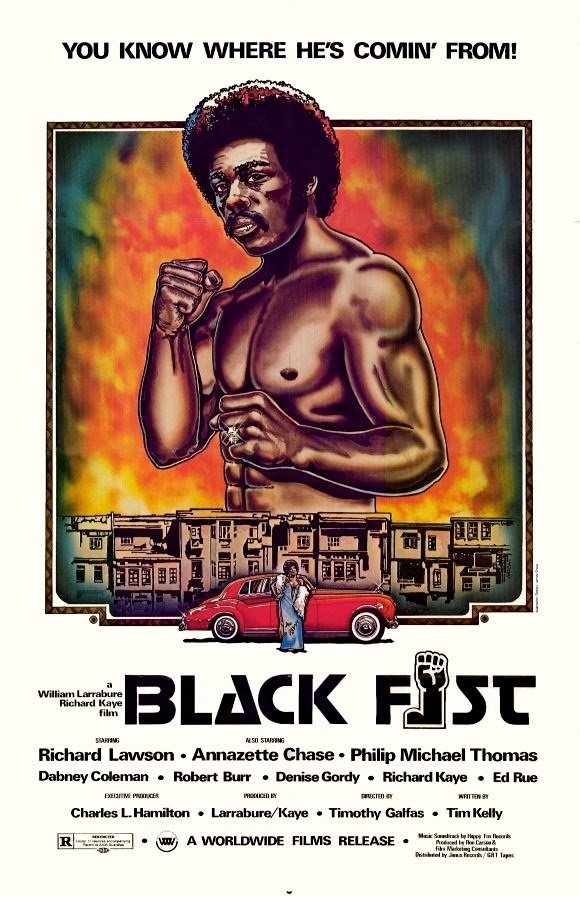The grim sport of illegal streetfighting hasn’t
been the subject of many movies, even though the image of desperate tough guys
pummeling each other for the benefit of underworld types is inherently
cinematic. And if Walter Hill’s directorial debut, Hard Times (1975), is perhaps the best big-screen exploration of
the subject, then Black Fist
represents a place much lower on the quality scale. Ostensibly a blaxploitation
picture but really just an inner-city drama with a protagonist who happens to
be African-American, Black Fist has problems common to low-budget exploitation movies—dodgy acting,
erratic storytelling, excessive violence—but it’s
watchable nonetheless. The basic plight of the hero, a guy who pays a terrible
price for latching onto what seems his only option for success, is deeply
relatable (“All I ever wanted in life was not to have to kiss whitey’s ass!”),
and the filmmakers slam viewers with plentiful lurid images and scenarios. So,
while the narrative momentum of Black
Fist is quite weak, owing to predictability and thin
characterizations, one can do worse in the realm of violent grindhouse fare
targeted at black audiences.
Richard Lawson, a handsome and muscular actor who
never escaped supporting roles and/or leading parts in B-movies, stars as Leroy
Fisk, a young man struggling to get by. He comes to the attention of a gaggle
of gangsters led by Ingo (Charles L. Hamilton) and Logan (Robert Burr), who
offer to sponsor him as a prizefighter. Although Larry does well in early bouts,
he realizes he’s obligated to share his winnings not only with the mobsters but
also with corrupt cop Heineken (Dabney Coleman). Angry that he’s being unfairly
exploited, Larry rebels, which causes his enemies to take deadly retribution on
Larry’s loved ones. Then Larry goes into hiding and systematically seeks revenge against his tormentors.
This is turgid stuff, with an episodic
structure and a mean-spirited tone keeping the pace slow. Furthermore, Lawson
and some of his costars, especially future Miami
Vice star Philip Michael Thomas, frequently succumb to silly overacting.
Yet the basic meat of the story is solid, and the presence of Coleman—who
subsequently became one of the great supporting actors of the ’80s—elevates the
movie considerably. With his naturalistic ad-libs and wicked laughs, Coleman
oozes believable, everyday villainy. That said, the makers of Black Fist leave good taste far behind
on many occasions, especially during a Death
Wish-style third act that features several cartoonish killings. Therefore, this picture is neither for discriminating viewers nor for the faint of
heart—but if grimy street violence is your thing, Black Fist might suit you nicely.
Black
Fist: FUNKY


No comments:
Post a Comment